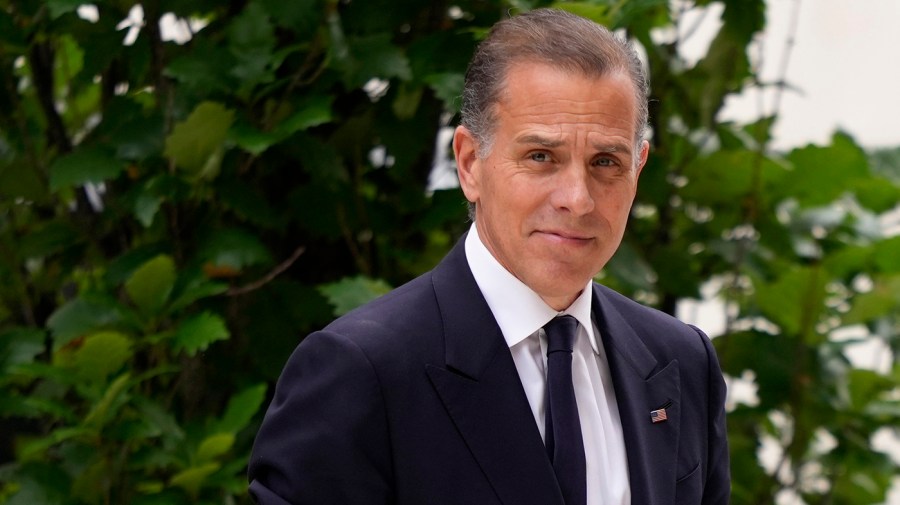
Hunter Biden is set to stand trial for a second time this year beginning this week, now on criminal charges he failed to pay more than a million dollars in federal taxes.
The president’s embattled son is accused of withholding at least $1.4 million between 2016 to 2019, in the throes of his addiction to crack cocaine following his brother’s death from brain cancer.
Biden’s drug addiction was a focal point of his earlier trial on felony gun charges, where a Delaware jury convicted him in June of lying about his use of illicit drugs on a federal gun purchase form. It marked the first criminal conviction of a sitting president’s child.
The sordid details of that time in Biden’s life are expected to play a similarly significant role in his tax trial, which a California-based federal judge scheduled to begin with jury selection on Sept. 5 and opening statements on Sept. 9. He’s pleaded not guilty.
At a hearing in Los Angeles federal court last month, Biden’s lawyer accused special counsel David Weiss’s team of attempting “character assassination” of the president’s son by seeking to show salacious evidence and testimony to jurors.
“They want to slime him because that is the whole purpose,” attorney Mark Geragos said.
That evidence could include details about Biden’s “extravagant” lifestyle at the time, from strip clubs and sex workers to alcohol and drug abuse.
Prosecutors have argued in court filings that Biden’s personal spending choices lend insight into his state of mind during the period he allegedly failed to file and pay his taxes, which could help jurors assess his culpability.
At the hearing, prosecutor Leo Wise pointed to Biden’s payment to a pornographic website as an example of what jurors could use to determine whether he purposefully or unintentionally listed clearly personal items as business expenses. Biden’s playboy lifestyle is also detailed in his memoir, the prosecutor said.
“He describes partying in hotels with a cast of strippers,” Wise said. “He chose to pay them, which is fine — it’s America, you can do that. But then he chose to take it as a business deduction.”
Biden’s lawyer asked to have any references to his “extravagant” lifestyle barred but said the president’s son would stipulate that he spent on generalized “personal expenses” if the court blocked prosecutors from describing them in lurid detail.
U.S. District Judge Mark Scarsi, who is overseeing the case, said that he would reserve a ruling on Biden’s request, instead asking the parties to preview any contentious evidence on an issue-by-issue basis at trial.
“The Court generally agrees with the Government that evidence of the precise nature of Mr. Biden’s expenditures is necessary for the jury’s assessment of Mr. Biden’s state of mind at least as to Counts 6 through 8,” Scarsi wrote in an Aug. 27 order on several pretrial motions, following the hearing.
The three counts referenced are the felony charges against Biden: one count of tax evasion and two counts of filing a false return. The other six charges he faces are misdemeanors.
“That said, the Court intends to maintain strict control under Rule 403 over the presentation of evidence that might be characterized as salacious,” the judge said, referring to a rule that lets courts exclude certain evidence if its value to the case is outweighed by the risk of prejudice or other considerations.
Hunter Biden and his father, President Biden, have openly addressed the younger Biden’s struggles with addiction, suggesting that the 2015 brain cancer death of his brother, Beau Biden, was a turning point in his already trauma-riddled life.
Scarsi precluded Hunter Biden’s legal team from arguing that either Beau Biden’s death or that the brothers’ survival of a 1972 car accident that killed his mother and infant sister were causes of the president’s son’s addiction.
“Evidence of the causes of Mr. Biden’s addiction is irrelevant, and neither party may elicit such evidence or refer to any alleged causes of Mr. Biden’s addiction in the opening statements,” the judge wrote.
During opening arguments in Hunter Biden’s gun trial earlier this year, his lawyer, Abbe Lowell, did reference those incidents, telling jurors that the president’s son was reeling from his trauma and in a “deep state of denial” about his drug use.
Despite the shadow it cast on the trial, Weiss, the special counsel, later contended that Biden’s addiction was only a piece of the government’s case about the “illegal choices defendant made while in the throes of addiction.”
Still, his affliction was laid bare.
Several of Biden’s past romantic partners — including his ex-wife, late brother’s widow and an ex-girlfriend — took the stand to testify about his drug use in the government’s case, in addition to testimony from his daughter, Naomi Biden, in the defense’s case.
After his conviction, he expressed gratitude for his rehabilitation.
“Recovery is possible by the grace of God, and I am blessed to experience that gift one day at a time,” Biden said.
Geragos, Biden’s lawyer in the tax case, is expected to argue that the president’s son did not “willfully” break the law. The lawyer has suggested that Biden’s addiction impacted his “decision-making and judgment,” to the extent that he could not have intentionally committed the crimes with which he’s charged.
But a jury of 12 Californians will ultimately decide. A conviction in the case, which charges Biden with nine counts, including tax evasion and filing false tax returns, would be the second against the president’s son, significantly raising the trial’s stakes.
Though Biden faces a maximum of 25 years in prison for his three felony gun charge convictions, first-time offenders are rarely given the maximum penalty; federal sentencing guidelines recommend a sentence between 15 to 21 months in prison. His sentencing is scheduled for Nov. 13.
However, he is no longer a first-time offender, and if convicted again, could face greater penalties.
The Associated Press contributed to this report.

